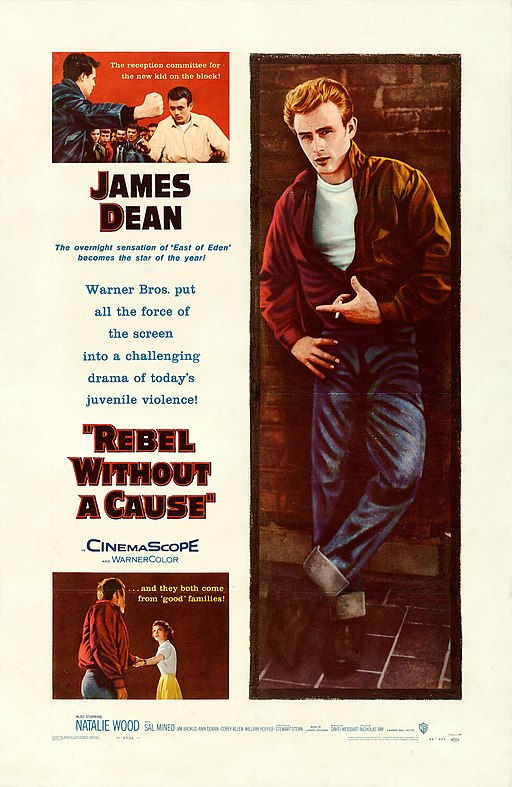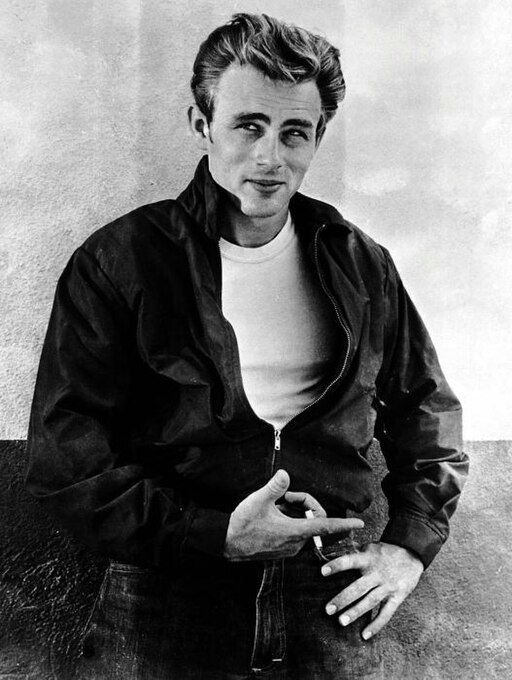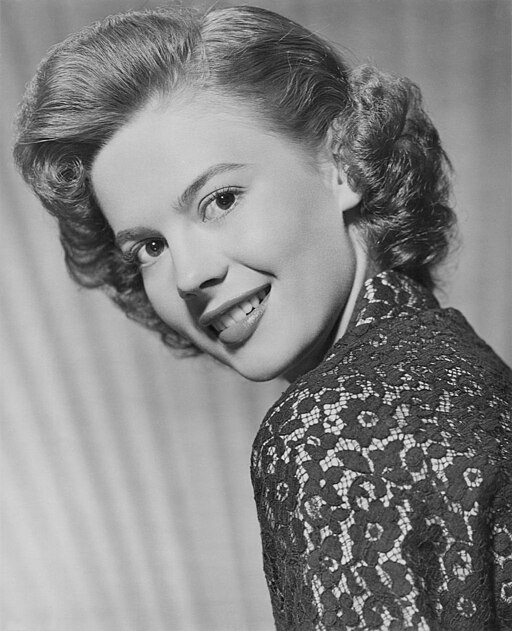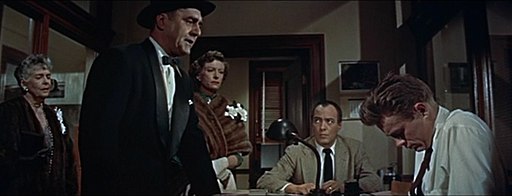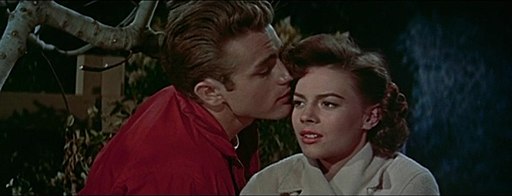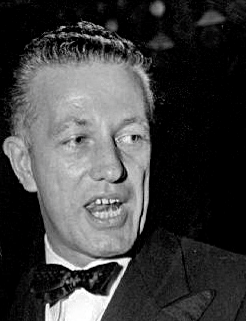Rebel Without a Cause - 1955
back| Released by | Warner Bros. |
| Director | Nicholas Ray |
| Producer | David Weisbart |
| Script | Stewart Stern, based on a story by Nicholas Ray; adaptation by Irving Shulman |
| Cinematography | Ernest Haller |
| Music by | Leonard Rosenman |
| Running time | 111 minutes |
| Film budget | $1.5 million |
| Box office sales | $4.5 million |
| Main cast | James Dean - Natalie Wood - Sal Mineo - Jim Backus - Ann Doran |
Rebel Without a Cause
An icon of teenage angst and the search for identity
"Rebel Without a Cause" is a seminal film that profoundly captures the social and emotional disarray of American youth in the 1950s. The film is particularly notable for James Dean's performance, which came to symbolize the angst and disenchantment of a generation.
The story revolves around the troubled lives of three teenagers – Jim, Judy, and Plato – as they navigate the challenges of adolescence, including family dysfunction, peer pressure, and the search for identity.
The film's portrayal of juvenile delinquency and its empathetic depiction of the struggles faced by the youth resonated strongly with audiences. Its influence extended far beyond the box office, leaving a lasting impact on American culture and cinema. "Rebel Without a Cause" is often cited for its style, thematic depth, and the intense performances of its young cast, particularly James Dean, who tragically passed away before the film's release. The film remains a poignant and enduring symbol of teenage angst and rebellion.
Related
Rebel Without a Cause
Summary, Analysis and Impact
"Rebel Without a Cause," directed by Nicholas Ray in 1955, is a landmark film that poignantly captures the existential angst and restlessness of American youth in the 1950s.
Plot:
The story revolves around Jim Stark (James Dean), a troubled teenager who moves to a new town with his family. Struggling to fit in and grappling with his own identity, Jim's internal turmoil is exacerbated by his dysfunctional family dynamics, particularly his frustration with his passive father.
On his first day at the new school, Jim befriends John "Plato" Crawford (Sal Mineo), a sensitive boy dealing with abandonment issues, and Judy (Natalie Wood), a girl seeking love and attention she doesn't receive at home. The trio forms a complex bond, navigating the challenges of adolescence, peer pressure, and a sense of alienation.
The film climaxes with a dramatic "chickie run" – a dangerous car game that ends tragically. The event sets off a chain of incidents that lead the characters to an abandoned mansion, where the vulnerabilities and deep-seated fears of Jim, Judy, and Plato come to the fore, culminating in a heartrending finale.
Main Cast:
- James Dean as Jim Stark: Dean's performance resonated deeply with teenagers of the time and cemented his status as a cultural icon.
- Natalie Wood as Judy: Wood portrays a young woman desperate for affection, delivering a performance that is both vulnerable and strong.
- Sal Mineo as Plato: Mineo's portrayal of a troubled, sensitive boy is poignant and impactful.
- Jim Backus as Frank Stark: Jim's father, characterized by his well-meaning but ineffectual demeanor.
- Ann Doran as Carol Stark: Jim's mother, whose controlling nature contributes to the family's dysfunction.
Impact and Legacy:
- Cultural Resonance: The film's portrayal of teenage angst and rebellion against societal norms struck a chord with the youth of the era. It became a touchstone for discussions about generational conflict, identity crises, and the challenges of adolescence.
- James Dean's Legacy: Released shortly after Dean's tragic death, the film immortalized him as a symbol of youthful disillusionment. His portrayal of Jim Stark is often considered a defining moment in American cinema.
- Stylistic Influence: The film's style, including its use of color, composition, and music, influenced future representations of adolescence in cinema. Its emotional depth and realistic portrayal of teenage life set a new standard for films about youth.
- Exploration of Social Issues: "Rebel Without a Cause" was one of the first films to address issues such as juvenile delinquency, parental neglect, and the search for belonging, themes that remain relevant.
In summary, "Rebel Without a Cause" is a powerful exploration of the complexities of teenage life, marked by outstanding performances and a sensitive portrayal of the characters' inner struggles. The film not only captures the essence of a generation but also remains a timeless reflection on the universal themes of youth, rebellion, and the quest for identity.
Analysis of “Rebel Without a Cause”:
Narrative and Themes:
- Teenage Angst and Alienation: The film captures the essence of adolescent confusion, frustration, and the search for identity. It portrays the lives of American teenagers grappling with internal and familial conflicts, societal expectations, and a sense of alienation.
- Family Dysfunction: A central theme is the breakdown of the traditional family unit. The film delves into the troubled relationships between the teenagers and their parents, highlighting a generational gap and lack of understanding.
- Search for Identity: Each of the main characters, Jim, Judy, and Plato, represents different facets of teenage insecurity and the search for identity. Their interactions and struggles portray the complexities of adolescence.
Characterization:
- Jim Stark (James Dean): Jim is the epitome of the misunderstood teenager. Dean's iconic performance brings vulnerability and intensity to the character, making Jim's struggle for identity and his rebellion against his ineffectual father universally relatable.
- Judy (Natalie Wood): Judy's character grapples with the need for affection, especially from her father, reflecting the struggles of young women in the 1950s.
- Plato (Sal Mineo): Plato represents the extreme result of neglect and the longing for a family. Mineo's performance adds a deep sense of vulnerability and emotional rawness.
Direction and Cinematography:
- Visual Style: Nicholas Ray uses color and composition to enhance the emotional landscape of the film. The iconic red jacket worn by Dean becomes a symbol of his character's rebellious nature.
- Cinematography: Ernest Haller’s cinematography captures the tension and drama, using lighting and angles to reflect the characters' turmoil.
Cultural Impact:
- Youth Representation: The film was groundbreaking in its portrayal of youth culture. It addressed topics like juvenile delinquency and the generational divide, which were rarely depicted with such depth in cinema at the time.
- James Dean's Impact: James Dean's performance resonated with teenagers of the era and contributed to his lasting legacy as a cultural icon. His portrayal of Jim Stark became a symbol of youthful rebellion.
Symbolism and Metaphors:
- The 'Chickie Run': This scene is a powerful metaphor for the recklessness of youth and the existential games played by the characters.
- The Abandoned Mansion: The mansion where the climax unfolds symbolizes a safe haven for the characters, a place where they confront their fears and desires away from societal judgment.
Music:
- Leonard Rosenman's score complements the film's emotional intensity. The music underscores the characters' inner turmoil and the dramatic tension of the narrative.
In conclusion, "Rebel Without a Cause" is a landmark film in its empathetic portrayal of teenage disillusionment and rebellion. It stands out for its powerful performances, particularly by James Dean, and its sensitive yet raw depiction of the trials of adolescence. The film remains a poignant, timeless exploration of the struggles faced by young people in their journey towards adulthood.
Full cast of “Rebel Without a Cause”:
- James Dean as Jim Stark
- Natalie Wood as Judy
- Sal Mineo as John "Plato" Crawford
- Jim Backus as Frank Stark
- Ann Doran as Carol Stark
- Corey Allen as Buzz Gunderson
- William Hopper as Judy's Father
- Rochelle Hudson as Judy's Mother
- Dennis Hopper as Goon
- Edward Platt as Ray Fremick
- Steffi Sidney as Mil
- Marietta Canty as Crawford Family's Maid
- Virginia Brissac as Mrs. Stark
- Ian Wolfe as Dr. Minton
- Frank Mazzola as Crunch
- Robert Foulk as Gene
- Jack Simmons as Cookie
- Tom Bernard as Harry
- Nick Adams as Chick
Analysis of Nicholas Ray’s direction:
Nicholas Ray's direction of "Rebel Without a Cause" (1955) is a masterful display of his ability to capture the complex emotional landscape of his characters, particularly the disaffected youth of the 1950s. His approach to the film is both sensitive and stylized, lending it a timeless quality that continues to resonate with audiences. Here is an analysis of his directorial work in the film:
Capturing Teenage Angst:
- Emotional Intensity: Ray excels in portraying the emotional intensity of adolescence. He captures the deep-seated angst, confusion, and yearning for acceptance that define his young characters, particularly through the performances of James Dean, Natalie Wood, and Sal Mineo.
- Character Development: Ray's direction allows the actors to explore the depths of their characters, resulting in performances that are nuanced and layered. He encourages a naturalistic acting style that brings authenticity to the film.
Visual Style:
- Color and Composition: Ray uses color and composition to enhance the film's emotional impact. The iconic red jacket worn by James Dean's character, Jim Stark, is a visual symbol of his rebellious and volatile nature.
- Cinematic Techniques: Ray's use of cinemascope and innovative camera angles creates a dynamic visual narrative. His framing often isolates the characters, reflecting their emotional isolation and disconnection from the adult world.
Thematic Exploration:
- Societal Commentary: Ray delves into themes of family dysfunction, societal pressure, and the search for identity. His direction brings to the fore the underlying tensions and moral ambiguities of 1950s American society.
- Symbolism: The film is rich in symbolism, which Ray uses to underscore the narrative themes. The 'chickie run' scene, for example, is not just a thrilling set piece but also a metaphor for the reckless bravado and existential challenges of youth.
Handling of Controversial Subjects
- Ray does not shy away from tackling controversial subjects for the time, such as juvenile delinquency and teenage turmoil. His approach is both empathetic and unflinching, providing a candid look at the issues facing young people.
Narrative Structure:
- Ray structures the narrative to build tension and develop character relationships gradually. The film's pacing reflects the internal struggles of the characters, with moments of intense confrontation interspersed with quieter, more introspective scenes.
Influence and Legacy:
- Ray's direction in "Rebel Without a Cause" had a significant influence on the portrayal of teenagers in cinema. The film is a landmark in Hollywood's depiction of youth culture and continues to be a reference point for films about adolescence.
In summary, Nicholas Ray's direction in "Rebel Without a Cause" is a crucial element of the film's enduring appeal. His ability to capture the complex emotional world of teenagers, combined with a distinctive visual style and a willingness to tackle difficult themes, makes the film a poignant and insightful study of youth and rebellion.
Analysis of James Dean’s performance:
James Dean's portrayal of Jim Stark in "Rebel Without a Cause" is iconic, capturing the essence of teenage disillusionment and angst in the 1950s. His performance is not only a cornerstone of the film but also a defining moment in cinematic history. Here's an analysis of his role:
Characterization of Jim Stark:
- Embodiment of Teen Angst: Dean's Jim Stark is the quintessential troubled teenager, grappling with a sense of alienation and a desperate need for understanding. He embodies the confusion and frustration of a generation caught between the conservative values of the past and the post-war societal changes.
- Emotional Vulnerability: Dean brings a profound sense of vulnerability to the character. His portrayal of Jim’s inner turmoil is palpable – his anger, his pain, and his longing for genuine connection resonate with a raw authenticity.
- Rebellion Against Authority: Jim's character is in constant rebellion against the adult world's authority and hypocrisy. Dean portrays this rebellion not just as a teenage phase but as a deeper, more existential struggle.
- Complex Family Dynamics: The strained relationship between Jim and his parents, particularly his father, is central to the film. Dean’s interactions with his on-screen parents highlight Jim’s longing for a moral compass and a stronger father figure, reflecting the broader generational conflict of the era.
Performance Style:
- Method Acting Approach: Dean’s method acting approach adds depth to his portrayal of Jim Stark. He immerses himself in the character, bringing an intense realism and emotional depth to his performance.
- Physicality and Expressiveness: Dean's physical expressiveness – his posture, movements, and facial expressions – conveys Jim's emotional state with subtlety and power. His famous shrug, his way of slouching, and the intensity in his eyes all contribute to a memorable and impactful character portrayal.
Cultural Impact:
- Youth Icon: Dean’s performance resonated deeply with the youth of the 1950s and beyond. Jim Stark became a symbol of youthful rebellion and disillusionment, with Dean’s portrayal influencing an entire generation’s view of adolescence and identity.
- Lasting Legacy: Although Dean's career was tragically short, his role as Jim Stark solidified his status as a cultural icon. His performance in "Rebel Without a Cause" continues to be celebrated for its authenticity and emotional impact.
Analyzing the performance of Natalie Wood as Judy:
Natalie Wood's performance in "Rebel Without a Cause" as Judy is a pivotal aspect of the film's exploration of teenage angst and identity crisis. Her portrayal is both nuanced and emotionally resonant, contributing significantly to the film's impact. Here's an analysis of her performance:
Complex Portrayal of Teenage Turmoil:
- Vulnerability and Longing: Wood captures the complexity of Judy's character - a teenager who outwardly appears tough and confident, but internally struggles with vulnerability and a longing for affection, especially from her father. Her portrayal reflects the tumultuous emotions common in adolescence, including the need for acceptance and love.
- Transition from Child to Adult: Wood skillfully portrays Judy's struggle with her emerging adulthood. She navigates the character's transition from childlike dependence to a more self-aware and mature individual, seeking meaningful connections.
Emotional Depth:
- Expressive Performance: Wood's expressive eyes and nuanced facial expressions convey Judy's internal conflicts and emotional depth. Her interactions with Jim Stark (James Dean) and Plato (Sal Mineo) showcase her ability to display a range of emotions, from affection and compassion to confusion and despair.
- Chemistry with Co-Stars: Wood's chemistry with James Dean is particularly noteworthy. She convincingly portrays Judy's growing attraction to Jim, evolving from initial skepticism to deep, genuine care. Her interactions with Sal Mineo's Plato add another layer of depth to her character, depicting a nurturing and protective side.
Symbol of Youthful Innocence and Rebellion:
- Representing Teenage Girls: Judy's character is emblematic of the experiences of many teenage girls during the 1950s. Wood's performance brings to light the societal pressures faced by young women of that era, including the struggle for independence and the desire to be understood and respected.
- Rebellion Against Societal Norms: Judy, much like Jim Stark, rebels against the societal norms and expectations of her parents' generation. Wood portrays this rebellion not as an act of defiance but as a quest for identity and self-worth.
Impact of the Role:
- Critical Acclaim: Wood's performance received critical acclaim and contributed to her rise as a prominent actress in Hollywood.
- Resonance with Audiences: Her portrayal resonated with contemporary audiences, especially teenagers who identified with Judy's emotional journey and challenges.
In summary, Natalie Wood’s portrayal of Judy in "Rebel Without a Cause" is a deeply impactful performance that captures the essence of teenage disillusionment and the quest for identity. Her ability to convey complex emotions and her chemistry with co-stars like James Dean contribute to making Judy a relatable and memorable character in this classic film.
Remarkable quotes from “Rebel Without a Cause”:
Jim Stark (James Dean): "You're tearing me apart!"
This line, delivered by Jim in a moment of intense emotional turmoil, has become one of the most iconic in film history, encapsulating the teenage angst and frustration at the heart of the film.
Judy (Natalie Wood): "Girls don't love their father. Since when? Since I got to be sixteen?"
Judy's line reflects her complex feelings towards her father and her struggle with her emerging identity and emotions.
Jim Stark: "Nobody listens to me."
This line succinctly captures Jim's sense of isolation and his longing to be understood and heard.
Plato (Sal Mineo): "If only you could have been my dad. We could have breakfast in the morning."
Plato's line to Jim reveals his deep-seated need for a father figure and the familial love he's been deprived of.
Jim Stark: "I mean, do you have to be a hero to have your own father... like you?"
This quote from Jim to his father highlights the generational conflict and Jim's desire for a stronger role model.
Judy: "I don't know what to do anymore. Except maybe die."
Judy’s line is a stark expression of her despair and confusion, a sentiment that resonates with the film's exploration of teenage angst.
Jim Stark: "Is this where we're gonna live now, Mom? No, this is not our home. It's just a house! A big, ugly, darn house!"
Jim's frustration with the constant moving and lack of stability in his family life is evident in this outburst.
Frank Stark (Jim Backus): "You can wake up now, the universe has ended."
Frank’s attempt at humor in a tense moment underscores the communication gap and the lack of serious understanding between him and Jim.
Awards and Nominations for “Rebel Without a Cause”:
Academy Awards (Oscars) 1956:
- Nominated for Best Supporting Actor: Sal Mineo for his portrayal of John "Plato" Crawford.
- Nominated for Best Supporting Actress: Natalie Wood for her role as Judy.
- Nominated for Best Writing, Motion Picture Story: Nicholas Ray was nominated for his story.

